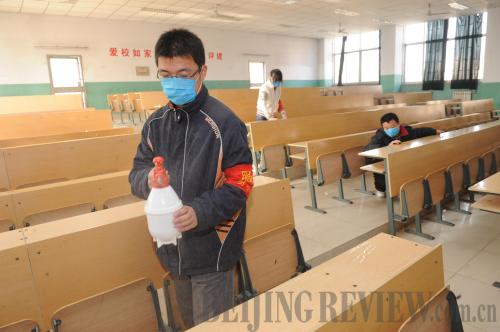|
 |
|
KEEP IT OUT: A local school in Weifang of Shandong Province has established teams to disinfect classrooms and dorms to prevent the A/H1N1 flu from spreading (XINHUA) |
In China, 20.34 million people had been inoculated against the A/H1N1 flu nationwide as of November 22, said China's Ministry of Health.
By November 22, about 1.79 million people in Beijing had been inoculated. More than 50 percent of students in the capital city's primary, middle schools and college students have now received inoculations, the municipal health bureau said at a November 24 press conference.
More than 400,000 people in the capital had been infected by the A/H1N1 flu virus, but there was not a big possibility of a large-scale disease outbreak in the near future, Fang Laiying, Director of the Beijing Municipal Health Bureau, said at a recent A/H1N1 forum.
Beijing reported 9,007 A/H1N1 cases as of November 23, comprising 8,655 mainland residents and 352 patients from China's Hong Kong, Macao and Taiwan. So far there had been 26 deaths reported, of whom 16 had died of basic diseases.
The overall flu situation was stable and the ratio of A/H1N1 flu cases compared to seasonal influenza strains had decreased from 79 to 51 percent, he said.
The ministry now releases vaccination information on a daily basis.
Almost 70,000 A/H1N1 flu cases had been reported on the Chinese mainland as of November 15, with 53 deaths in total.
The ministry increased flu information updates from three times a week to the present bulletin daily, a positive move made to "reflect the trend of A/H1N1 flu in China and offer better guidance to the public," the ministry said.
A slew of measures including quarantine and inoculation have been taken on a large scale by the government to slow the transmission of A/H1N1 virus.
China has attended to the problem in every detail: from isolating those entering the country who exhibit flu-like symptoms—to local authorities canceling school classes at the slightest hint of the disease and ordering students and teachers to stay home.
Chinese and foreign health officials said these measures have helped slow the spread of the disease in the world's most populous country, which began a nationwide A/H1N1 flu vaccination campaign in early September, the first country to do so.
"I think there was a variety of measures put in place by different countries, and it's difficult to say what worked well and what didn't, but China's measures have worked very well," Dr. Michael O'Leary, Director of the Beijing office of the World Health Organization, told the media in mid-November.
"If these strict measures had not been taken, and if there had been a sudden outbreak of the disease, there would have been mass panic among the Chinese population," Fang said. "Although there had been much criticism from outside, people should understand China's situation."
China developed a comprehensive plan for a pandemic after disastrous SARS, or severe acute respiratory syndrome, outbreak experiences in 2003. Strict quarantine measures are now always given priority, and they are quickly backed by education programs about the particular type of disease.
As China closely monitors the flu situation, it's also endeavoring to find more methods to curb it. Good news came from Dalian City in northeast China's Liaoning Province where an A/H1N1 virus infected girl donated blood plasma to another child infected by the same disease and the results proved effective.
In the meantime, the Health Ministry said on November 19 it would impose severe punishment on officials who concealed deaths from A/H1N1 flu, responding to respected medical expert Zhong Nanshan who said the suspected cases may have been covered up by local governments.
China also adopted a new method of classifying the effects of A/H1N1 flu early in November. Now, if a person is confirmed with A/H1N1 flu and then dies, the case is required to be reported as a death from A/H1N1 flu, whether or not there was another condition.
"If reports of A/H1N1 virus cases are held back, lied about or delayed, the people responsible will be punished," said ministry spokesman Deng Haihua. | 